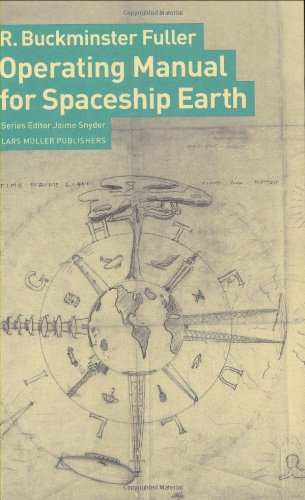R. Buckminster Fuller: Operating Manual for Spaceship Earth (1968)
Filed under book | Tags: · architecture, earth, engineering, sustainability, synergy, systems theory

“In this essay on man Mr. Fuller expresses what may well be his penultimate view of the human condition. Here, in a mood at once philosophical and involved, Mr. Fuller traces man’s intellectual evolution and weighs his capability for survival on this magnificent craft, this Spaceship Earth, this superbly designed sphere of almost negligible dimension in the great vastness of space.”
HTML (from bfi.org, via Internet Archive, updated on 2015-1-16)
EPUB, MOBI (thanks Marcell Mars; updated on 2015-1-16)
Levi R. Bryant: The Democracy of Objects (2011)
Filed under book | Tags: · object, object-oriented ontology, onticology, ontology, philosophy, speculative realism, systems theory

Since Kant, philosophy has been obsessed with epistemological questions pertaining to the relationship between mind and world and human access to objects. In The Democracy of Objects, Bryant proposes that we break with this tradition and once again initiate the project of ontology as first philosophy. Drawing on the object-oriented ontology of Graham Harman, as well as the thought Roy Bhaskar, Gilles Deleuze, Niklas Luhman, Aristotle, Jacques Lacan, Bruno Latour and the developmental systems theorists, Bryant develops a realist ontology that he calls “onticology”. This ontology argues that being is composed entirely of objects, properties, and relations such that subjects themselves are a variant of objects. Drawing on the work of the systems theorists and cyberneticians, Bryant argues that objects are dynamic systems that relate to the world under conditions of operational closure. In this way, he is able to integrate the most vital discoveries of the anti-realists within a realist ontology that does justice to both the material and cultural. Onticology proposes a flat ontology where objects of all sorts and at different scales equally exist without being reducible to other objects and where there are no transcendent entities such as eternal essences outside of dynamic interactions among objects.
Print and downloadable e-book versions will be available soon from the publisher.
Publisher: Open Humanities Press, September 2011
New Metaphysics series
ISBN 978-1-60785-204-9
Licensed under a Creative Commons Attribution-ShareAlike 3.0 Unported License.
PDF (updated on 2012-7-17)
View online (HTML; requires a free account)
Niklas Luhmann: Ecological Communication (1986–) [DE, EN]
Filed under book | Tags: · anthropology, ecology, environment, law, nature, philosophy, politics, science, social science, society, sociology, systems theory

“This work by Niklas Luhmann further develops the theories of the author by offering a challenging analysis of the relationship between society and the environment.
Luhmann extends the concept of ‘ecology’ to refer to any analysis that looks at connections between social systems and the surrounding environment. He traces the development of the notion of ‘environment’ from the medieval idea—which encompasses both human and natural systems—to our modern definition, which separates social systems from the external environment.
In Luhmann’s thought, human beings form part of the environment, while social systems consist only of communications. Utilizing this distinctive theoretical perspective, Luhmann presents a comprehensive catalog of society’s reactions to environmental problems. He investigates the spheres of the economy, law, science, politics, religion, and education to show how these areas relate to environmental issues.”
Publisher Westdeutsches Verlag, Opladen, 1986
4th edition published by VS Verlag für Sozialwissenschaften/GWV Fachverlage GmbH, Wiesbaden, 2004
ISBN 3531517759
275 pages
English edition
Translated by John Bednarz, Jr.
Publisher University of Chicago Press, 1989
ISBN 0226496511, 9780226496511
187 pages
Ökologische Kommunikation. Kann die moderne Gesellschaft sich auf ökologische Gefährdungen einstellen? (German, 4th ed., 1986/2004, updated on 2012-7-17)
Ecological Communication (English, 1989, no OCR, updated on 2012-7-17)

